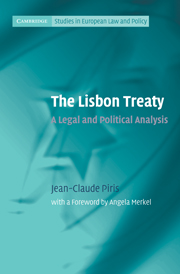Book contents
- Frontmatter
- Contents
- List of boxes
- Foreword by Angela Merkel, Chancellor of the Federal Republic of Germany
- Acknowledgements
- Table of cases
- List of abbreviations
- Introduction
- I The origins and birth of the Lisbon Treaty
- II General provisions
- III Democracy
- IV Fundamental Rights
- V Freedom, Security and Justice
- VI Institutions
- VII External affairs
- VIII Financial, economic, social and other internal affairs
- Conclusion: the Lisbon Treaty and beyond
- Appendixes
- References
- Index
- References
V - Freedom, Security and Justice
Published online by Cambridge University Press: 05 June 2012
- Frontmatter
- Contents
- List of boxes
- Foreword by Angela Merkel, Chancellor of the Federal Republic of Germany
- Acknowledgements
- Table of cases
- List of abbreviations
- Introduction
- I The origins and birth of the Lisbon Treaty
- II General provisions
- III Democracy
- IV Fundamental Rights
- V Freedom, Security and Justice
- VI Institutions
- VII External affairs
- VIII Financial, economic, social and other internal affairs
- Conclusion: the Lisbon Treaty and beyond
- Appendixes
- References
- Index
- References
Summary
A short history of Justice and Home Affairs in the EU
The 1957 Rome Treaty did not contain provisions conferring powers on the Community in the area of Justice and Home Affairs. Co-operation among Member States in this field was being developed in the larger framework of the Council of Europe. The only provision dealing with a judicial issue was Article 220 of the EC Treaty (later renumbered 293 and now repealed by the Lisbon Treaty), which requested the Member States to conclude conventions between themselves on, inter alia, ‘the simplification of formalities governing the reciprocal recognition and enforcement of judgments of courts or tribunals and of arbitration awards’. The 1968 Brussels Convention on jurisdiction and the enforcement of judgments in civil and commercial matters was concluded on this basis.
Co-operation between Member States in the field of Justice and Home Affairs began in the 1970s. It took place in the framework of European Political Co-operation, as well as in the margins of the Council, involving ministers for home affairs on issues such as terrorism and police co-operation, drugs or border controls. The so-called ‘TREVI Group’ was established informally in June 1976, following a request from the European Council meeting in Rome in December 1975. Discussions in the margins also began to involve justice ministers concerning judicial co-operation, although most developments in judicial matters continued to take place within the larger framework of the Council of Europe and the Hague Conference on private international law.
- Type
- Chapter
- Information
- The Lisbon TreatyA Legal and Political Analysis, pp. 167 - 203Publisher: Cambridge University PressPrint publication year: 2010



